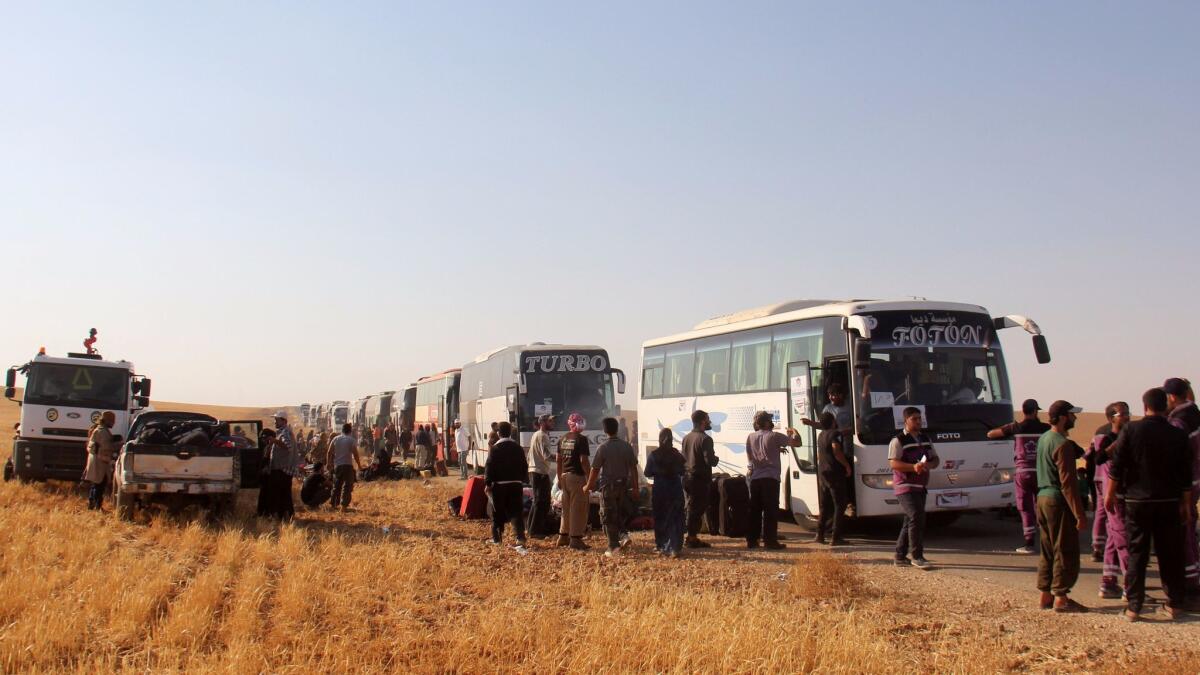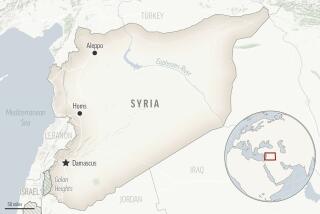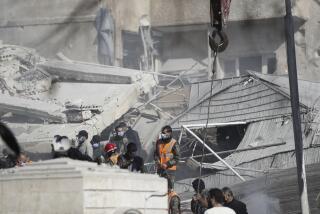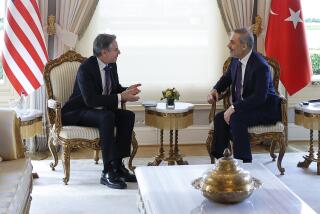Departure of Syrian rebels and refugees from Lebanon raises specter of forced returns

For the second time in a matter of weeks, thousands of rebel fighters and civilian refugees who had found a haven in Lebanon are being transported back to Syria to live in what is being billed as a “safe zone” in the war-torn country.
Depending on the point of view, the transfers are humanitarian gestures to people longing to return home, a security measure to protect Lebanon from extremists or a forceful removal of vulnerable refugees that could herald wider-scale expulsions.
Thousands of Syrians have fled in recent years into Lebanon, where many citizens have grown increasingly tired of hosting the newcomers.
Buses were expected to begin transporting 3,000 Syrian rebel fighters and civilian refugees from a remote area in northeastern Lebanon to Syria on Monday morning.
The transfer was part of an agreement negotiated between Hezbollah — the Iranian-backed Lebanese political party and militia — and the group Saraya Ahl al-Sham, which is affiliated with the Free Syrian Army rebel coalition.
Saraya Ahl al-Sham hopes to dislodge Syrian President Bashar Assad from power. Hezbollah supports Assad.
Lebanon’s state news agency said Sunday that 35 buses, along with a fleet of ambulances, had arrived in Arsal to take about 400 militants — which it described as “armed terrorists” — and their families to the rebel-controlled Syrian town of Ruhaiba, about 30 miles northeast of Damascus.
It’s estimated that 350 to 400 people slated to be transferred this week are rebels who have been fighting against the Assad government; the rest are family members of the rebels and other civilians.
Hussein abu Ali, a spokesman for Saraya Ahl al-Sham, questioned the security of the “safe zones,” but said the group had little choice but to agree to the pact.
“There is no region in Syria under the control of the opposition [that is] safe, because these areas are subject to shelling at any moment,” he said. The group had accepted the deal, he said, because it was “approval or murder.”
Reporters were not allowed to enter the area. A media operation run by Hezbollah posted video of a caravan of buses rolling through the dusty hills.
Khaled Raad, a community leader among the refugees in Arsal who was not part of the exodus, said Sunday that about 65,000 Syrians remained in the area, most from the areas of Homs, Qusair and Qalamoun. They want to return home, he said, but not under the present conditions.
“In my opinion, they all want to return to their villages … but away from Assad’s rule — under international patronage and United Nations’ supervision, far from Assad’s authority,” he told The Times.
This week’s exodus comes after a separate agreement to return Syrian fighters and refugees to Syria between Hezbollah and Hayat Tahrir al-Sham, another rebel coalition headed by the Islamist group formerly known as Al Nusra Front.
Hayat Tahrir al-Sham also had been operating in the Arsal area, and the group was routed in a military operation headed by Hezbollah last month. That resulted in the deal to transfer an estimated 9,000 insurgents and civilians from Lebanon to rebel-held areas in Syria.
In a speech Sunday marking the 11th anniversary of the cease-fire that ended the 2006 war between Israel and Lebanon, Hezbollah leader Hassan Nasrallah drew parallels between that fight — which ended with Israel’s withdrawal from Lebanon — and the recent battle in Arsal.
Israel “is among the most saddened” by Hezbollah’s victory in the Arsal area, Nasrallah said.
“Israel and America are crying over the failure,” he said, because the rebels, like Israel and the U.S., oppose Assad.
The United Nations Office for the Coordination of Humanitarian Affairs said it was coordinating aid for 5,288 people who had arrived in northwestern Syria from the Arsal area under the earlier deal to transfer 9,000 people. The status of the remaining people was unclear.
In a statement, the U.N. agency questioned the agreements to return refugees to Syria.
“The U.N. and the humanitarian community had no part in reaching this agreement and have repeatedly expressed deep concern at the continuing use of such ‘local agreements,’ which do not appear to meet international legal standards or humanitarian principles,” it said. “Such movements should be voluntary and within a conducive protection environment.”
The question of when and how Syrians should return to their country has become a highly charged one in Lebanon, a tiny country that is hosting more than 1 million refugees while its own population is about 4 million.
Increasingly, political leaders — including Lebanese President Michel Aoun — have made calls for the refugees to return home, whether willingly or not. Even before the recent battles, several dozen refugee families had been transported from Arsal back to Syria under yet another arrangement brokered by Hezbollah.
Raad, the refugee community leader in Arsal, said in spite of the increasing pressure, he plans to remain in Lebanon.
“The truth is that there is no law in the United Nations or in the Security Council system or even in international norms or laws that prevents a refugee from deciding to remain,” he said. “Even if there are some pressures, staying is the best decision.… It’s not possible to send people to their death.”
Sewell is a special correspondent.
ALSO
What does it take to secure a border? Lessons from the wall dividing San Diego and Tijuana
In St. Petersburg, a stalwart of the 1917 revolution lives on: the communal apartment
Meet Charles Robert Jenkins, an American detained by North Korea for 40 years
UPDATES:
3:40 p.m.: This article was updated with comments from Hussein abu Ali, a rebel group spokesman.
This article was originally published at 2:40 p.m.
More to Read
Start your day right
Sign up for Essential California for news, features and recommendations from the L.A. Times and beyond in your inbox six days a week.
You may occasionally receive promotional content from the Los Angeles Times.







